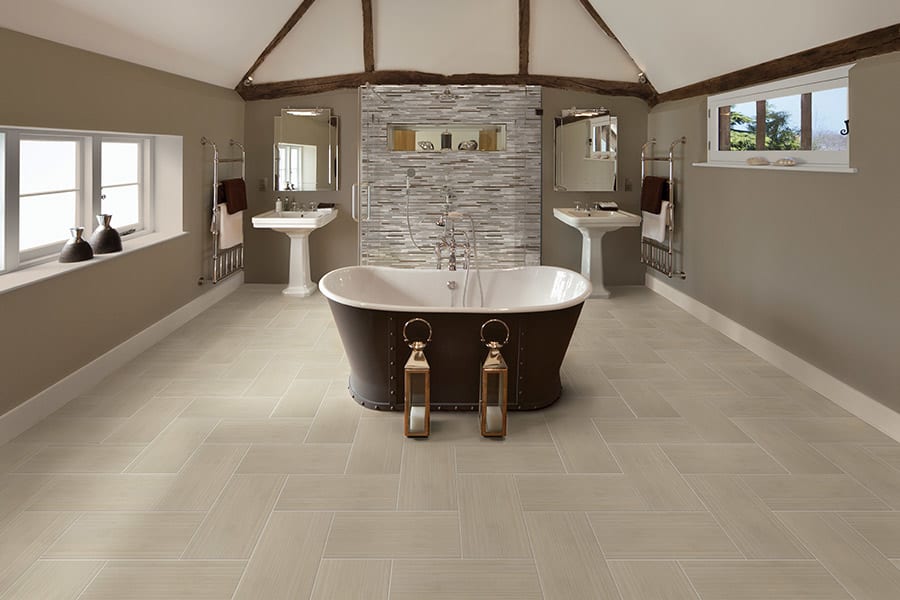Buying tips for ceramic tile
Our installers are CTEF certified – why does this matter?
Certification identifies an installer as being a dedicated and knowledgeable professional whose competence in installing tile has been verified to meet specific tile industry standards.
The Ceramic Tile Education Foundation (CTEF) program is a rigorous program that tests expertise, how well the installer keeps up with the fast-changing world of tile – from thin tile to very large-sized tile to new installation materials and tools – and how knowledgeable he or she is about tile installation best practices.
Certifications help separate talented and expert tile installers from those who create the type of situations we all dread, botched Tile on Floors, Walls and in Showers, nothing is worse than paying for a tile project that you are simply not satisfied with. That is guaranteed not to be the case with Hastings. To a homeowner, hiring a certified tile installer means peace-of-mind that an elegant bathroom wall or sophisticated kitchen backsplash with wood-look floor tile installation will be done right the first time and looks spectacular for years to come. This is why Hastings is a certified CTEF installer.
Certification identifies an installer as being a dedicated and knowledgeable professional whose competence in installing tile has been verified to meet specific tile industry standards.
The Ceramic Tile Education Foundation (CTEF) program is a rigorous program that tests expertise, how well the installer keeps up with the fast-changing world of tile – from thin tile to very large-sized tile to new installation materials and tools – and how knowledgeable he or she is about tile installation best practices.
Certifications help separate talented and expert tile installers from those who create the type of situations we all dread, botched Tile on Floors, Walls and in Showers, nothing is worse than paying for a tile project that you are simply not satisfied with. That is guaranteed not to be the case with Hastings. To a homeowner, hiring a certified tile installer means peace-of-mind that an elegant bathroom wall or sophisticated kitchen backsplash with wood-look floor tile installation will be done right the first time and looks spectacular for years to come. This is why Hastings is a certified CTEF installer.
The correct subfloor structure is critical to performance
Ceramic tile, more than any other form of flooring, requires the proper subfloor system and setting materials. A double subfloor system with the total thickness of 1-1/4 in., over floor joists 16 in. on center is required. The top subfloor layer should be exterior grade plywood or an underlayment specifically designed for ceramic tile installation like cementous backer board.
Special setting materials are available which will allow ceramic tile installations over existing floors that are solid and already meet the above requirements. Failure to provide a sturdy base can cause grout to crack and release or tile to crack.
Special setting materials are available which will allow ceramic tile installations over existing floors that are solid and already meet the above requirements. Failure to provide a sturdy base can cause grout to crack and release or tile to crack.
Request a consultation
Although many ceramic tiles look the same, there are quality differences
The quality of raw materials, the firing process, and the sophistication of glazing applications that create realism will determine the quality of the finished product. These quality differences are often reflected in the price.
Selecting the right surface glaze is an important step when selecting floor tile
Floor tiles are rated for glaze wear and slip resistance, which are important factors to consider. Glaze ratings should exceed 3 for residential applications with the exception of bath areas that can use tiles rated 2. Tiles with a slip resistant rating of 0.5 or better should work well in most indoor residential applications.
Request the best in setting materials
New latex modified mortars and grouts provide better strength while also allowing greater flexibility.
Special caution
Dropping objects on ceramic tile–particularly heavy ones–can chip even the best tiles.
Request the best in setting materials
New latex modified mortars and grouts provide better strength while also allowing greater flexibility.
Special caution
Dropping objects on ceramic tile–particularly heavy ones–can chip even the best tiles.












